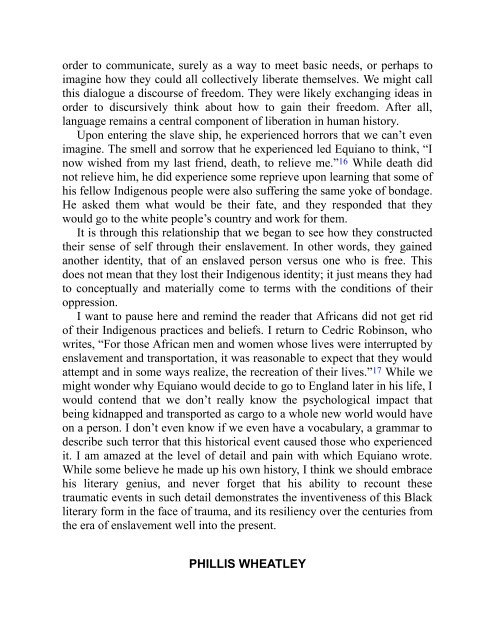Create successful ePaper yourself
Turn your PDF publications into a flip-book with our unique Google optimized e-Paper software.
order to communicate, surely as a way to meet basic needs, or perhaps to<br />
imagine how <strong>the</strong>y could all collectively liberate <strong>the</strong>mselves. We might call<br />
this dialogue a discourse <strong>of</strong> freedom. They were likely exchanging ideas in<br />
order to discursively think about how to gain <strong>the</strong>ir freedom. After all,<br />
language remains a central component <strong>of</strong> liberation in human history.<br />
Upon entering <strong>the</strong> slave ship, he experienced horrors that we can’t even<br />
imagine. The smell and sorrow that he experienced led Equiano to think, “I<br />
now wished from my last friend, death, to relieve me.” 16 While death did<br />
not relieve him, he did experience some reprieve upon learning that some <strong>of</strong><br />
his fellow <strong>Indigenous</strong> people were also suffering <strong>the</strong> same yoke <strong>of</strong> bondage.<br />
He asked <strong>the</strong>m what would be <strong>the</strong>ir fate, and <strong>the</strong>y responded that <strong>the</strong>y<br />
would go to <strong>the</strong> white people’s country and work for <strong>the</strong>m.<br />
It is through this relationship that we began to see how <strong>the</strong>y constructed<br />
<strong>the</strong>ir sense <strong>of</strong> self through <strong>the</strong>ir enslavement. In o<strong>the</strong>r words, <strong>the</strong>y gained<br />
ano<strong>the</strong>r identity, that <strong>of</strong> an enslaved person versus one who is free. This<br />
does not mean that <strong>the</strong>y lost <strong>the</strong>ir <strong>Indigenous</strong> identity; it just means <strong>the</strong>y had<br />
to conceptually and materially come to terms with <strong>the</strong> conditions <strong>of</strong> <strong>the</strong>ir<br />
oppression.<br />
I want to pause here and remind <strong>the</strong> reader that Africans did not get rid<br />
<strong>of</strong> <strong>the</strong>ir <strong>Indigenous</strong> practices and beliefs. I return to Cedric Robinson, who<br />
writes, “For those African men and women whose lives were interrupted by<br />
enslavement and transportation, it was reasonable to expect that <strong>the</strong>y would<br />
attempt and in some ways realize, <strong>the</strong> recreation <strong>of</strong> <strong>the</strong>ir lives.” 17 While we<br />
might wonder why Equiano would decide to go to England later in his life, I<br />
would contend that we don’t really know <strong>the</strong> psychological impact that<br />
being kidnapped and transported as cargo to a whole new world would have<br />
on a person. I don’t even know if we even have a vocabulary, a grammar to<br />
describe such terror that this historical event caused those who experienced<br />
it. I am amazed at <strong>the</strong> level <strong>of</strong> detail and pain with which Equiano wrote.<br />
While some believe he made up his own history, I think we should embrace<br />
his literary genius, and never forget that his ability to recount <strong>the</strong>se<br />
traumatic events in such detail demonstrates <strong>the</strong> inventiveness <strong>of</strong> this Black<br />
literary form in <strong>the</strong> face <strong>of</strong> trauma, and its resiliency over <strong>the</strong> centuries from<br />
<strong>the</strong> era <strong>of</strong> enslavement well into <strong>the</strong> present.<br />
PHILLIS WHEATLEY


















